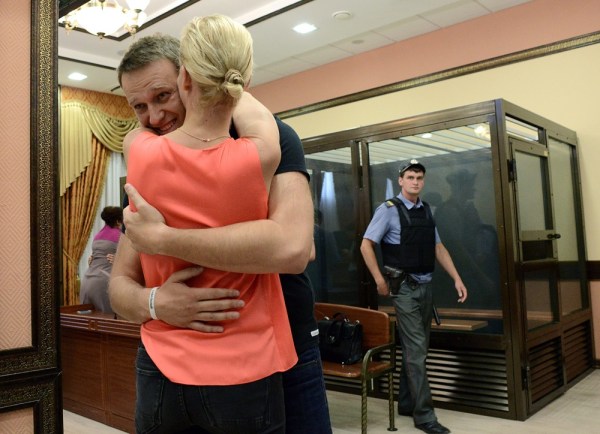
Valentina Svistunova / EPA
Russian opposition figure Alexei Navalny embraces his wife Yulia after he was freed by Regional court of Kirov region following a protest of prosecutor's office in Kirov, Russia, on Friday.
By Gabriela Baczynska, Reuters
KIROV, Russia -- Russia unexpectedly freed opposition leader Alexei Navalny on bail on Friday, bending to the will of thousands of protesters who denounced his five-year jail sentence as a crude attempt by President Vladimir Putin to silence him.
In a ruling that points to Kremlin uncertainty over how to handle Navalny's case and revived protests, a judge approved an unusual prosecution request to release him while he awaits the outcome of an appeal.
The anti-corruption campaigner's movements will be restricted to Moscow but he proclaimed the ruling, one day after he was convicted of theft, as a victory for people power.
"I am very grateful to all the people who supported us, all the people who went to (protest in Moscow's) Manezh Square and other squares," the 37-year-old said, rushing across the court to hug his wife after he was released from a glass courtroom cage.
"We understand perfectly well what has happened now. It's an absolutely unique phenomenon in Russian justice," he said in the court in Kirov, an industrial city 550 miles northeast of Moscow.
People poured onto the streets of big Russian cities to protest on Thursday evening after Navalny was convicted of stealing at least $494,000 from a timber firm when he was advising the Kirov regional governor in 2009.
Police said more than 200 people were detained in St Petersburg and Moscow although there were no big clashes.
Navalny says the case was politically motivated and intended to sideline him as a political threat to Putin, even though his support is limited outside the big cities and opinion polls show the president is still Russia's most popular politician.
Navalny led anti-Putin protests which attracted tens of thousands last year before they started to fade when the former KGB spy was elected to a six-year third term as president.
The decision to release him could be a political maneuver to head off social unrest. Some political analysts said the Kremlin, and the business and security community around it, looked divided over Navalny.
Russia's most notable anti-corruption campaigner and opposition leader has been found guilty of embezzlement and sentenced to five years in prison. The U.S. ambassador said the trial was apparently politically motivated. Channel Four's Jonathan Rugman reports
"There really is a split in the elite," one analyst, Ella Paneyakh, said in an online comment. "And it seems there will be no peaceful outcome."
The Kremlin has not responded to calls for comment on the verdict and said nothing about Friday's ruling.
The United States and European Union voiced concern over Navalny's conviction, saying it raised questions about the rule of law and Russia's treatment of Putin's opponents.
The White House called it part of a "disturbing trend aimed at suppressing dissent."
Russian shares fell on Thursday on concerns the conviction may provoke unrest, after a case that led to comparisons with the political "show trials" under Soviet leader Josef Stalin.
At least 3,000 people protested near the Kremlin in Moscow on Thursday under a heavy police presence, blocking main streets and shouting "Freedom" and "Putin is a thief."
Police plunged into the crowd to pluck out people holding Navalny portraits. A police official said about 50 were detained, but activists said the number had reached 169 as smaller groups continued to protest past midnight.
At least 1,000 people protested in St. Petersburg, where police said about 40 were detained, and smaller rallies were held in other cities.
Related stories:
Copyright 2013 Thomson Reuters. Click for restrictions.mega lottery sag aftra mega mill power ball livan hernandez soledad o brien mega ball
No comments:
Post a Comment